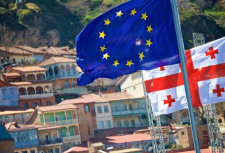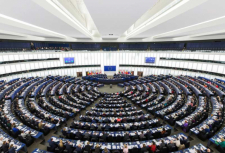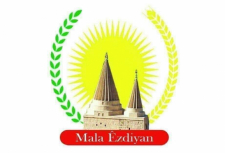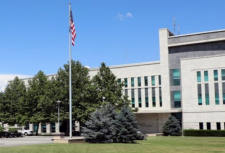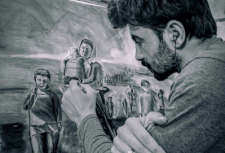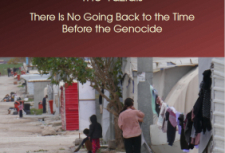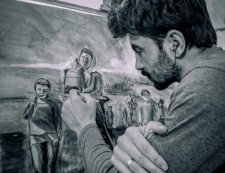2018 Nobel Peace Prize Laureate Nadia Murad stresses the power of stories to round out SHAPE Week
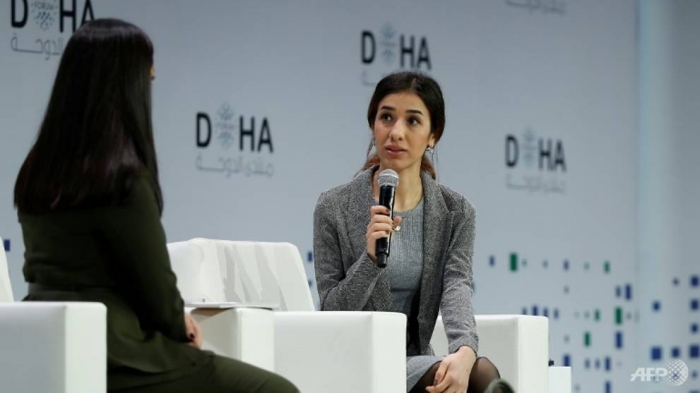
By Preetha Ramachandra
At the culminating event of the Sexual Harassment and Assault Prevention and Education (SHAPE) week, Nadia Murad, a 2018 Nobel Peace Prize Laureate, discussed the power of unity and the goals of Nadia’s Initiative, her project aimed at promoting global advocacy for the Ezidi people. Murad’s talk was the finale for SHAPE week—a series of events and presentations coordinated by Duke Student Government ad-hoc senators Eden Schumer and Jake Jeffries, both sophomores. Sunday evening, Murad was joined onstage in Page Auditorium, where she last spoke in 2018, by Abid Shamdeen and Olivia Wells, executive director and director of programs of Nadia’s Initiative, respectively. The trio shared their experiences of the tragic events that took place in Nadia’s hometown of Sinjar, Iraq, which was attacked by ISIS Aug. 3, 2014. Security forces quickly fled to northern Iraq, Shamdeen recalled. While the U.S. government aided the people with limited airstrikes that created a corridor for escape and some Yazidis were able to evade the attack, many were left behind—and thousands of Ezidis, including Murad’s family members, were enslaved, captured, killed or displaced.
“You would think that the mass enslavement of Ezidi women and children would have created an urgent response from the international community. However, to this day, no task force has been created to work on rescuing those still missing,” Murad said.
The ISIS fighters who carried out the attack have yet to be accountable, Murad pointed out.
“Unless we speak out and demand accountability, this violence will continue. Accountability challenges the notion that certain groups of people are ultimately without rights,” she said
It is for this reason that she stressed that people must work together to challenge impunity and promote justice—a struggle that shouldn’t be hard for American students to conceptualize, she said. “Though our struggles may appear different, our fight and goals are the same: to end all kinds of violence against women,” Murad said. “Women deserve peace and equality, whether they are living in [internally displaced person] camps in Iraq or attending classes on a university campus”. Murad also spoke directly to young people, applauding them for calling out injustice in their communities and stating that she hopes the young people in the audience continue to use their voices to call out injustice and fight impunity.
Much of this change comes from sharing stories, and Murad made it clear that the stories of the Ezidi women have immense power.
Should anyone go visit the area, Murad said, you would meet thousands of women who lost their husbands and family members, yet these devastating stories have the ability to instill in all of us the power to speak “truth to power.”
Ezidi24.com
Tags: #yazidisinfo #ezidi #nadiamurad
2018 Nobel Peace Prize Laureate Nadia Murad stresses the power of stories to round out SHAPE Week

By Preetha Ramachandra
At the culminating event of the Sexual Harassment and Assault Prevention and Education (SHAPE) week, Nadia Murad, a 2018 Nobel Peace Prize Laureate, discussed the power of unity and the goals of Nadia’s Initiative, her project aimed at promoting global advocacy for the Ezidi people. Murad’s talk was the finale for SHAPE week—a series of events and presentations coordinated by Duke Student Government ad-hoc senators Eden Schumer and Jake Jeffries, both sophomores. Sunday evening, Murad was joined onstage in Page Auditorium, where she last spoke in 2018, by Abid Shamdeen and Olivia Wells, executive director and director of programs of Nadia’s Initiative, respectively. The trio shared their experiences of the tragic events that took place in Nadia’s hometown of Sinjar, Iraq, which was attacked by ISIS Aug. 3, 2014. Security forces quickly fled to northern Iraq, Shamdeen recalled. While the U.S. government aided the people with limited airstrikes that created a corridor for escape and some Yazidis were able to evade the attack, many were left behind—and thousands of Ezidis, including Murad’s family members, were enslaved, captured, killed or displaced.
“You would think that the mass enslavement of Ezidi women and children would have created an urgent response from the international community. However, to this day, no task force has been created to work on rescuing those still missing,” Murad said.
The ISIS fighters who carried out the attack have yet to be accountable, Murad pointed out.
“Unless we speak out and demand accountability, this violence will continue. Accountability challenges the notion that certain groups of people are ultimately without rights,” she said
It is for this reason that she stressed that people must work together to challenge impunity and promote justice—a struggle that shouldn’t be hard for American students to conceptualize, she said. “Though our struggles may appear different, our fight and goals are the same: to end all kinds of violence against women,” Murad said. “Women deserve peace and equality, whether they are living in [internally displaced person] camps in Iraq or attending classes on a university campus”. Murad also spoke directly to young people, applauding them for calling out injustice in their communities and stating that she hopes the young people in the audience continue to use their voices to call out injustice and fight impunity.
Much of this change comes from sharing stories, and Murad made it clear that the stories of the Ezidi women have immense power.
Should anyone go visit the area, Murad said, you would meet thousands of women who lost their husbands and family members, yet these devastating stories have the ability to instill in all of us the power to speak “truth to power.”
Ezidi24.com
Tags: #yazidisinfo #ezidi #nadiamurad
